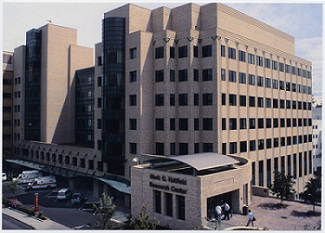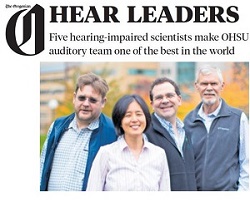Resident Research
The Otolaryngology – Head & Neck Surgery Residency Program at OHSU offers a variety of research opportunities to train residents in the fundamentals of being a scientist. Many elective opportunities are available for those that are interested. Take a look at how we approach research rotations and keep an eye on this page for future information about the dedicated researchers that residents have worked with in the past.
Research rotations

Special to our program is the total of 6 months of dedicated research that all our residents go through. Your research experience begins at the end of your first year when you start exploring labs and looking for research mentor to work with for your structured research rotations. Our resident research committee meets with you to discuss options and offer support and then at the beginning of your second year you’ll spend a month working with your research mentor to develop a grant proposal. In addition to the support from your research mentor you will also have the support of our departments grant writing specialist who will make sure your proposal smoothly works its way through the OHSU research award mechanism, faculty experienced in grant writing, and the direct support of Dr. Rachel Dresbeck, Senior Director of OHSU Research Development in the form of an introductory lecture on grant writing, an open door to Dr. Dresbeck’s grant writing expertise throughout your process, and a grant writing workshop closer to your submission date. By the end of this one-month rotation residents will have submitted a research grant proposal and have a working research plan which means that they can hit the ground running during their next research rotation during PGY-3.
During PGY-3 our residents enjoy 5 months of protected research time in the form of a research rotation during which will take minimal call and have minimal clinical and OR responsibilities. During this exciting rotation, residents work in their research mentor's lab, collect data, work with lab personnel to learn about data analysis, and prepare at least one paper for submission for publication to a peer reviewed journal and presentation at a national conference. Many residents leave this rotation with a wealth of data that can be further analyzed and prepared for publication and presentation, as well as a close working relationship with their research mentor and lab personnel that they can look to for support throughout the rest of their residency. This rotation is a chance to consolidate knowledge after the work of PGY-2 and is when many residents decide where their future in Otolaryngology is and prepare accordingly.
Throughout your entire structured research rotations you will be supported by the department’s Resident Research Committee, whose faculty members are all highly talented researchers or physician-researchers.
Research outside rotations
Our clinical faculty are all active researchers, writers, and presenters. Many residents and medical students get involved with various research projects already in process before, during, and after their research rotations. Getting involved in research projects is made even more appealing when you take into account the full funding the department provides residents who are presenting content at national/international conferences. Take a look at the faculty page to get an idea of the kind of projects our faculty have going on.
Research publications and presentations
During the 2023-2024 academic year our residents published and/or presented a total of 38 pieces of research as either 1st or 2nd author. Notable projects included " Outcomes Following Treatment for Carotid Blowout in Head and Neck Cancer Patients ”, “Effects of Cochlear Implantation and Steroids on the Aging Guinea Pig Cochlea”, “Multicenter Survival Analysis and Application of an Olfactory Neuroblastoma Staging Modification Incorporating Hyams Grade” and “Health care disparities and chronic rhinosinusitis: Does neighborhood disadvantage impact outcomes in sinonasal disease?"

Our department enjoys a close working relationship with the world renown Oregon Hearing Research Center which has many NIH funded scientists dedicated to discovering the basic science around hearing loss. In addition to the OHRC, our department has close working relationships with labs studying the early detection of H&N cancer, and the basic science behind H&N cancer and its treatment. The faculty listed below are just a snapshot of the research scientists that our residents work with. If you’re interested in learning more about a specific faculty member then don’t hesitate to send a message to otohnseducation@ohsu.edu and we’ll help you get connected.